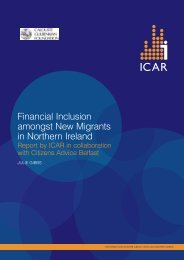Uncovered: assessing media and communications needs ... - ICAR
Uncovered: assessing media and communications needs ... - ICAR
Uncovered: assessing media and communications needs ... - ICAR
- No tags were found...
Create successful ePaper yourself
Turn your PDF publications into a flip-book with our unique Google optimized e-Paper software.
However a large proportion of the refugee <strong>and</strong> migrant worker organisations have received <strong>media</strong>/<strong>communications</strong> training (second highest of the groups). This may mean that the training was notuseful; or that they don’t have the capacity to carry out the tasks recommended to them; or that itwas useful but they had no reason or desire to engage with the <strong>media</strong>; or the training was poor orinadequate. It might also refl ect the attention being paid to this sort of training amongst new migrantorganisations. Interviews with statutory organisations <strong>and</strong> NGOs indicate a high degree of awareness<strong>and</strong> interest in <strong>media</strong> impact on community cohesion in this area. Conversely (<strong>and</strong> consistent with thefi ndings in 3.4) feedback from focus groups suggests individual migrant workers are unlikely to read orrelate to the local <strong>media</strong>.As stated, refugees, migrants <strong>and</strong> BME organisations are least likely to know how to contactthe <strong>media</strong>. Faith groups are not far behind. This is a basic skill <strong>and</strong> a starting point for a <strong>media</strong>/<strong>communications</strong> strategy, <strong>and</strong> something that should be a priority in any training programme.Fig 3.Information gained from interviews with some support organisations reported that BME organisationslack confi dence in dealing with the <strong>media</strong>. One respondent suggested that BME communities feelsegregated from <strong>and</strong> consequently have low expectations of the mainstream <strong>media</strong>. It was proposedby the same person that this resistance might be overcome by appropriate training.Refugee groups demonstrated enthusiasm for engaging with the <strong>media</strong> <strong>and</strong> optimism about thepotential benefi ts that might ensue. They suggested it could help strengthen their voice in thecommunity, reduce misunderst<strong>and</strong>ings, challenge stereotypes, help integrate new people <strong>and</strong> improvecommunity relations. They also saw its potential to increase membership, promote projects <strong>and</strong>access funding.In the faith sector the research revealed differences <strong>and</strong> some tensions between approaches <strong>and</strong>attitudes at national <strong>and</strong> local level. The Christian denominations (Church of Engl<strong>and</strong>, RomanCatholics <strong>and</strong> Methodists) tend to have sophisticated <strong>media</strong> relations machines <strong>and</strong> attendant trainingprogrammes at the national level. This does not always fi lter down to very local groups howeverwho reported feeling ill-equipped to engage with the <strong>media</strong> <strong>and</strong> unconvinced that they would haveanything to gain from such contact. They were also concerned about the issue of legitimacy <strong>and</strong> whowas qualifi ed to speak for their faith.20 <strong>Uncovered</strong>: <strong>assessing</strong> <strong>media</strong> <strong>and</strong> <strong>communications</strong> <strong>needs</strong> <strong>and</strong> capacity of marginalised communities
















